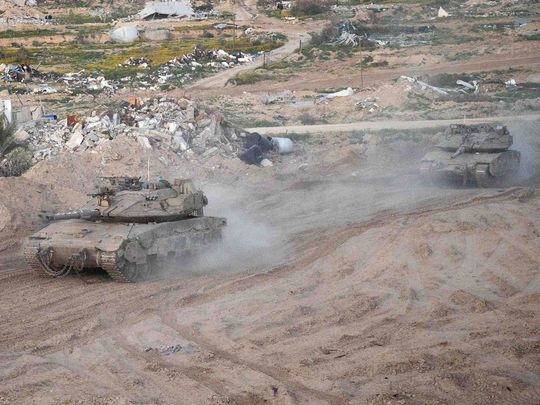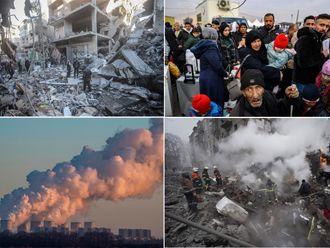
In recent years, we’ve witnessed a colossal shift through the technology revolution, unleashing a deluge of opinions and ideas that spread rapidly in this era of digital transformation. This information, often unchecked and unverified, finds its way to audiences whose minds may be more susceptible or lack the necessary critical thinking skills to differentiate fact from fiction.
As a result, many individuals readily accept what they read or see online without scepticism or validation. The unchecked spread of information through this digital revolution penetrates every facet of life, including health, religion, economy, sociology, education, and, notably, politics, often without the support of evidence or logical reasoning.
Amid this backdrop, we’re watching what some describe as moral barbarism unfolding in Israel’s treatment of Palestinians, particularly in Gaza. The Israeli right, akin to “wolves in sheep’s clothing,” perpetrates acts that shock even staunch supporters of Israel in the West.
However, much of the global response remains verbal and superficial. While there’s condemnation, action is lacking. The suffering of Gaza’s people — enduring hunger, thirst, medicine shortages, and the constant fear of death — continues unabated as TVs broadcast the horrors of terror and images of genocide.
Long-standing issue
Many people, especially those with historical and cultural ties to the Palestinians, document and sympathise with their plight. A lot of discussions taking place about Oct. 7 attack often attribute it to a more significant underlying cause: the blockade on Gaza.
This blockade has deprived Palestinians of the prospect of survival as an independent people, akin to other nations worldwide. This reasoning holds true for many, suggesting that the events of Oct. 7 were a consequence of this long-standing issue.
Yet there’s another dimension to consider: the relationship between action and purpose. This questions whether the desired outcome of an action has been achieved, partially or entirely. In the case of Oct. 7, was the intended goal realised, or did it fail to bring about any meaningful change?
Honestly speaking, after enduring close to six months of conflict where tens of thousands of Palestinians, including men, women, and children, lost their lives, has Hamas moved any closer to achieving its objectives through these sacrifices by the people of Gaza? Or have these actions failed to yield any tangible results for their cause?
It’s plausible to say that Oct. 7 events served the interests of certain regional powers that supported them. However, in terms of achieving any goals for the Palestinians, little progress seems evident. Instead, what’s clear to any rational observer is the immense human toll and suffering resulting from these actions. Those who remain endure lives marked by hardship and the despair that accompanies the loss of life on such a scale.
Throughout history, nations have made sacrifices in their struggles against others, and often these sacrifices have led to realising their desired objectives, or at least some of them. However, in the conflict between Israel and Hamas, there appears to be little to show in terms of gains for Hamas or the Palestinians. Instead, the predominant outcome has been a profound loss of human life, notwithstanding the optimistic narratives that attempt to portray such losses as victories.
One prevailing notion in the region was the existence of the “axis of resistance,” signifying a coalition openly hostile to Israel and purportedly dedicated to defending Palestinian rights. This axis vowed to respond to any Israeli action with even greater force.
Dialogue and understanding
However, following the Oct. 7 events, enthusiasm within this axis waned. Instead of standing firm, it began to rationalise its positions, sometimes failing to acknowledge the reality of what occurred and, at other times, prioritising self-preservation over solidarity. Meanwhile, public rhetoric advocating support for the resistance remains fervent on various platforms.
The international community is now waiting for a ceasefire, hoping to halt the ongoing conflict and condemn the resulting losses. However, alongside global sympathy, there’s a growing chorus of dissent directed at Hamas. Some nations, including Britain, are now classifying organisations with similar ideologies to Hamas as terrorist entities. Meanwhile, Hamas remains adamant about retaining control over Gaza, despite recent efforts for Palestinian unity.
A recent attempt at forming a technocratic government for all Palestinians quickly unravelled, sparking heated tensions between Fatah and Hamas. While ostensibly objecting to the government’s composition, the real issue lies in the refusal to acknowledge Palestinian unity, revealing a deep-seated division and a thirst for exclusive power, even amid the rubble of conflict.
What the Palestinian cause is going through today is indeed shaped by numerous events, with a significant factor being the global disapproval of Israeli actions against civilians and a growing sympathy towards the victims. This has created a political window that hasn’t been seen in the past seven decades, largely brought to light through the suffering endured by the people of Gaza.
The plight of Gaza has garnered significant international support, independent of Hamas’s actions or ideology. However, this sympathy doesn’t necessarily extend to Hamas or its “axis of resistance” rhetoric. To capitalise on this political opportunity, strategic and nuanced approaches are needed. If Hamas persists in maintaining control over Gaza as its primary objective, international support may diminish.
The fading interest in the Palestinian cause over the years has often been attributed to rhetoric that prioritises emotional appeal over practical solutions, a trend that has been difficult to reverse due to cultural tendencies in the Arab world towards immediate, emotionally comforting responses rather than reasoned analysis or consideration of facts.
In conclusion, the scenario evokes the wisdom of ancient Arabic poetry, such as the saying by Ibn Al Rumi, “If you gave me a pen, I would have smashed swords and spears with it.” This highlights the power of intellect and wisdom over brute force, suggesting that meaningful change and resolution in conflicts often require thoughtful dialogue and understanding rather than aggression or violence.
Mohammad Alrumaihi is an author and Professor of Political Sociology at Kuwait University




_resources1_16a45059ca3_small.jpg)







